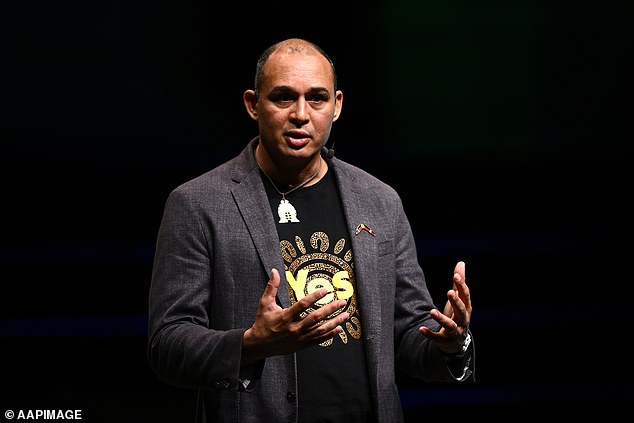Thomas Mayo declares a Voice to Parliament could still go ahead in Australia – and reveals his theory on why many voted against it

An Aboriginal and Torres Strait Islander voice in parliament is still needed, campaigners say, a year after the referendum defeat.
More than 60 percent of Australians voted ‘no’ in the referendum on October 14, 2023, with every state and territory – apart from the ACT – rejecting the proposal to establish a permanent advisory body and constitutional recognition of First Nations people .
One of the architects of the Uluru Statement from the Heart, Megan Davis, said there was still a need for a voice, both constitutionally and statutory.
“The vote for no was in fact a vote for no change and consequently there has been no change,” she told AAP.
Professor Davis said structural change was needed to make a difference to people’s lives, and that state-based treaties and truth-telling processes would not be enough.
“Any state-based process, whether for a vote, a treaty or the truth, is vulnerable to political shifts, as we saw when the Northern Territory moved away from truth-telling after their recent elections,” she said.
“Without a coordinated national voice, we are stuck with a piecemeal approach that will not deliver the lasting change First Nations People need across the country.”
Despite the defeat, Thomas Mayo, one of the leading proponents of ‘yes’, said constitutional changes could still happen down the road, he said in an interview with ABC host Patricia Karvelas.

Thomas Mayo (pictured) said there is still a need for a voice for indigenous people and there is hope for constitutional change, a year after losing the referendum

It has been a year since the referendum on the indigenous vote was held in Parliament and the yes vote was lost
“Do you accept that this particular proposal, having been rejected by the Australian people, is dead – or do you think it can still have a future,” Karvelas asked.
“There is still a future where indigenous people are included in the constitution. Certainly, in reality it won’t happen again for a while,” Mayo replied.
‘It will take a while before politicians will have the courage to put it to the people and hope for the best.
‘In a democracy we don’t always get it right. If we accepted the “no” answers we received on equal wages or on our right to vote as indigenous people…things would be even worse today.
“Because more than 60 percent of young people between the ages of 18 and 24 voted ‘yes’, that tells me that we have a future and that what we tried to do last year will be achieved.”
He also declared the No campaign.
“Most of the people who voted no were probably driven by the tactic of confusion, but were also guided by the fear that they would personally lose something.
‘And the slogan ‘if you don’t know, vote no’ was unfortunately extremely powerful.
He said Yes campaigners at voting booths heard No campaigners making false claims about The Voice.
“They said people were going to use their backyards, their farms and things like that, so I don’t think people were voting no to progress.
“They unfortunately fell for the tactics that were used.”
Indigenous Australians spokeswoman Jacinta Nampijinpa Price said the referendum remained a waste of time and money.
“It was a task that ultimately divided our country, and at a time when we no longer need to be divided, the Albanian government has unfortunately put all its eggs in one basket,” she told ABC TV.
“The Albanian government has not implemented any method to improve conditions or change things on the ground.”
After the referendum result, Indigenous academic Marcia Langton declared that reconciliation was dead.
But Senator Nampijinpa Price said supporters of the vote should go further.
“The ‘yes’ campaigners need to let go, accept the outcome because Australia made that decision, and move on,” she said.
“There are marginalized Indigenous Australians whose lives need to be impacted in a positive way now.”
Employment Minister Murray Watt said the government made the right decision to go ahead with the referendum, despite signs it was heading for defeat at the polls.
“This was a proposal about enshrining the rights of First Nations people in our constitution and we did not feel it was appropriate to ignore their wishes, either at the start of the campaign or as the campaign progressed,” he told ABC Radio.
“This is going to be a pretty painful day for First Nations Australians, a lot of hope was pinned on the Voice to Parliament proposal.”




